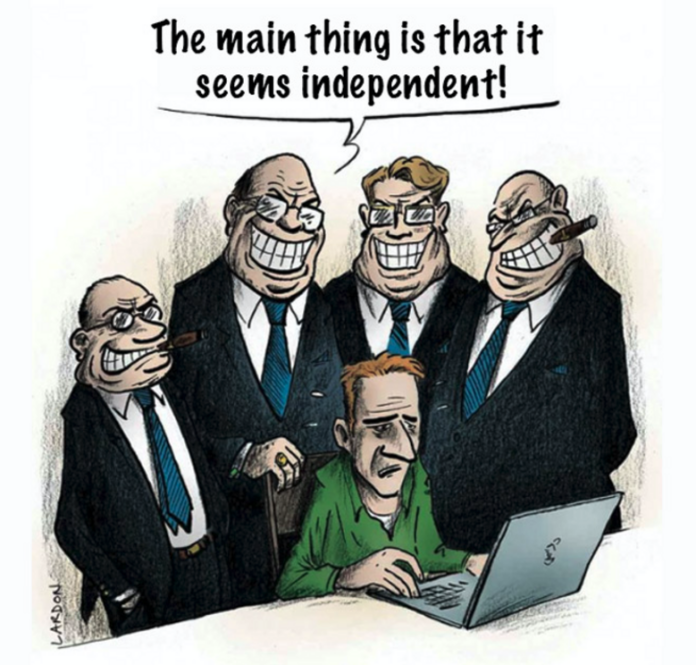Journalist commissioned by agency to ghostwrite articles defending glyphosate
… and attacking IARC
His articles appeared in media outlets worldwide under made-up author names. Report by Claire Robinson
In an article for the French political magazine Fakir, the journalist Julien Fomenta Rosat tells how he was commissioned by a shadowy agency to write numerous articles to influence public opinion. These included articles aimed at discrediting the International Agency for Research on Cancer (IARC) after it classified glyphosate as a probable carcinogen. The agency, iStrat, acted as a middleman for unknown clients whose anonymity was carefully concealed.
The 595 articles that the journalist eventually wrote appeared in media outlets worldwide, including recognized media blogs for the Huffington Post, Mediapart, and the French financial daily paper Les Échos, under a variety of apparently made-up author names and fake biographies. Topics included the advantages of e-cigarettes; praise for EDF’s expertise in nuclear energy; Eurasian and African policies; Airbnb’s unfair competition with hoteliers; and reassurances about the safety of France’s smart meter system, called Linky, in the face of public fears over electromagnetic radiation and bans from town mayors.
One topic that he was repeatedly asked to write about stands out: The supposed safety of glyphosate and the perverse attitude of IARC in flagging up its probable carcinogenicity.
Glypho Score, who specialise in unpicking the spin of the pesticide lobby, have pointed out in a thread on Twitter that these ghostwritten pieces on glyphosate contain the usual pesticide lobby talking points:
* Favourable comparison of glyphosate’s toxicity with that of table salt
* Suggestions that glyphosate prevents world hunger (as well as helping climate change and keeping food prices low)
* Statements that IARC’s view is at odds with that of regulatory agencies that find it safe (the short explanation for this is that IARC relies on published data – which is mostly peer-reviewed and authored by academic scientists – whereas regulatory agencies largely rely on a massive pile of non-peer-reviewed unpublished industry studies)
* Claims that IARC is somehow linked to environmental groups.
Rosat was glad of this work, as he needed to support his family on an otherwise meagre freelance income. He found he could churn out the required articles at speed, earning easy money for his efforts. Eventually, however, his conscience began to balk at the glyphosate commissions. He confided in his partner, who forbade him to write any more such articles. He took the message to heart: “Caught up in the system, churning out trash copy, I forgot the essentials: The power struggles, the pressures behind these seemingly innocuous articles. And their concrete consequences, in the short or long term, on our lives. I won’t write about IARC anymore, despite repeated requests from the Agency. Pass it on to other writers.”
Rosat says that decision came at a cost, because churning out these articles is well paid. Why is that? “I have the answer every day, when I find them at the top of the results on Google News. This is precisely the objective sought by their sponsors: To flood the Internet with flattering or complacent content for their customers in order to influence public opinion, facilitate their business or hit a competitor. A fire at the Flamanville nuclear power plant in Normandy is making headlines in the media? I am urgently ordered to produce a series of articles to highlight the safety of nuclear facilities in France, the rigour of controls and the reliability of subcontracting. Like a firefighter called to put out the fire.”
Rosat was only able to deduce the identity of iStrat’s commissioning client in the case of one topic – a series of articles he was asked to write that denigrated certain luxury brands while bigging up another (the client’s).
The identity of the client who commissioned the pro-glyphosate articles remains unknown. But we do know that Monsanto was heavily involved in a ghostwriting campaign involving research and articles promoting the safety of the pesticide glyphosate and attacking IARC’s conclusions. We also know that a PR agency working for Monsanto set up fake farmer groups across Europe, including in France, to defend the use of glyphosate and published a ghostwritten op-ed in Les Échos under a farmer’s name (GMWatch wrote about this PR operation here). Funnily enough, you may remember that Les Échos’ blog was among the platforms on which Rosat’s pieces popped up.
Rosat finally outed the agency in an interview with an investigative journalist, effectively cutting his ties with them. The agency then failed to pay his last bill, but he writes that this was “A very small price to pay for my regained independence”.
Rosat notes that to cover their tracks, the leaders of iStrat changed the name of their company several times and merged it with others, to ultimately form Maelstrom Media – the “MM” company that he invoiced for his articles. Glypho Score points out that in January this year, the investigative TV programme Complement d’enquête revealed the link between Maelstrom Media and iStrat, which has since become Avisa Partners. And Glypho Score also notes that Mediapart claims to be in possession of documents mentioning some sort of agreement between Avisa Partners and Bayer for the publication of content on social networks to “counter anti-GMO activism”.
Worryingly for the French people, a note from the editor of Fakir at the foot of the article notes that “iStrat, the digital lobbying agency, was co-directed from June 2013 to 2014 by… Olivia Grégoire, the current government spokesperson!” The editor comments ironically, “No doubt: We can trust [President] Macron to favour the common interest, the interest of the people, in the face of lobbies of all kinds.”
The article gives a fascinating and frightening glimpse of one way that public opinion is manipulated by covert operators who hide their profit-making agendas behind a facade of independent journalism.
The cartoon above comes from the original Fakir article and can be viewed (with French caption) here.

